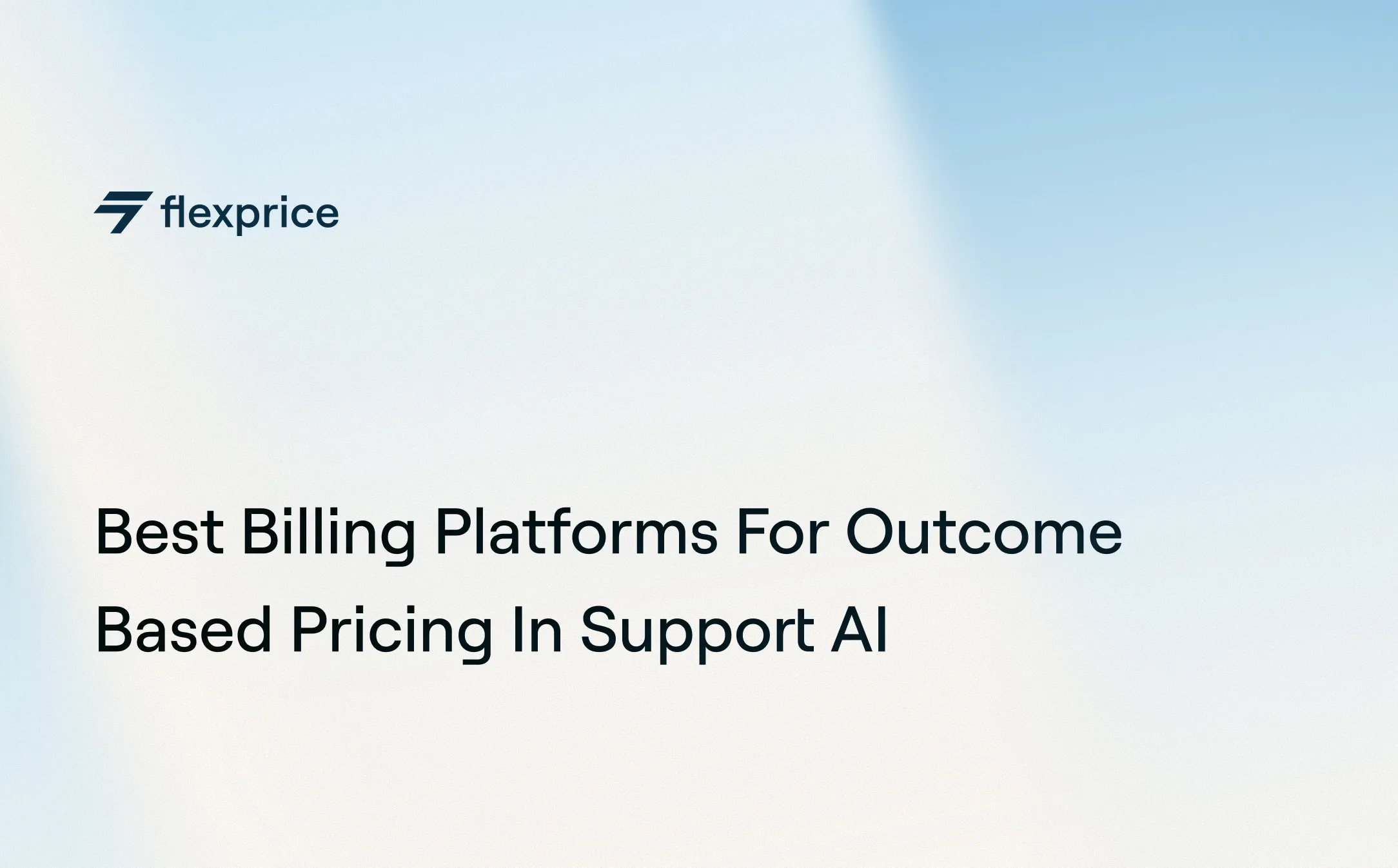 Aanchal Parmar
Aanchal Parmar Aanchal Parmar
Aanchal ParmarBest Billing Platforms for Outcome Based Pricing in Support AI
Best Billing Platforms for Outcome Based Pricing in Support AI
Best Billing Platforms for Outcome Based Pricing in Support AI
Best Billing Platforms for Outcome Based Pricing in Support AI
Sep 20, 2025
Sep 20, 2025
Sep 20, 2025
• 10 min read
• 10 min read


Aanchal Parmar
Product Marketing Manager, Flexprice
Product Marketing Manager, Flexprice





A founder once told us, “We don’t want to charge for access. We want to charge for results.”
They were building a Support AI product, one that resolved tickets autonomously. But when it came to billing, every tool they tried focused on usage, not outcomes.
The problem wasn’t how many messages their AI sent. It was how many issues it actually solved.
If you’re in the same boat, this guide is for you.
We’ll walk you through billing platforms that can support outcome-based pricing, and show you why most tools still fall short when the unit of value is resolution, not usage.
What outcome-based pricing really means in Support AI
Most billing models are built around actions: API calls, tokens used, seats activated. But Support AI doesn’t operate in actions, it operates in outcomes.
Your customer doesn’t care how many times your agent responded. They care if the issue was resolved without escalation. If your AI saved them time. If it reduced the pressure on human teams.
That’s what outcome-based pricing captures. You define success, like a resolved ticket or a deflected conversation, and bill only when that success happens.
It’s not about tracking noise. It’s about tying billing to what actually matters.
Done well, this model builds trust. Your customers see exactly what they’re paying for, and why. And you get rewarded for delivering results, not volume.
But to make this work, your billing system needs to understand outcomes. Not usage, not seats but outcomes. That’s where most platforms fall short.
What to look for in an outcome based billing platform
You should be able to define specific events, like “ticket resolved” or “chat deflected”, and use those events as billing triggers. If the event doesn’t happen, the customer doesn’t get charged.
The platform should let you combine flat-fee plans with outcome-based charges. You’ll often want a steady base subscription plus variable billing tied to success.
Customers should be able to see exactly what they’re paying for. That means clear usage reports, outcome summaries, and invoices this at connect the dots.
You need control over how outcomes are counted. Some models require you to bill for unique users, others for the latest event status, or custom aggregations like “only if escalated = false.”
The developer experience matters. If your team can’t instrument events, simulate plans, or push billing data cleanly, you’ll spend more time fixing billing than improving the product.
Top 4 outcome based billing platform for support AI platforms
1. Flexprice
As your product resolves tickets, deflects chats, or reduces escalations, Flexprice gives you the structure to bill for those outcomes, on your terms.
You start by defining the events that matter: a resolved ticket, an AI-led handoff that didn’t escalate, a customer conversation closed without follow-up. These aren’t just tracked, they’re billable.
You can map those events to billing through:
Webhooks (fire-and-forget, handled asynchronously)
SDKs (Node.js, Python)
Or direct API calls from your product backend
Every event ties back to a customer, grant, and usage policy so you stay in control of how billing is triggered, calculated, and surfaced.
Behind the scenes, Flexprice gives you multiple aggregation strategies that work well for outcome-based pricing:
Count Unique → e.g., 1 resolution per ticket ID, even if updates happen later
Latest → e.g., only bill if the final status is resolved
Custom → e.g., filter only non-escalated resolutions with a specific confidence threshold
You can combine these with credit-based pricing, where every outcome burns down a wallet, supporting pre-granted credits, expirations, and top-ups.
Many Support AI teams choose to offer “100 resolutions/month” bundles and then bill for overages, Flexprice makes that structure simple to implement.
You don’t have to rebuild logic for invoicing either. Flexprice supports hybrid plans, flat subscription fees, usage-based overages, or outcome-triggered credits without needing a second tool or workaround.
For customers, outcome transparency is built in. You can show exactly what they’re paying for and why, with breakdowns by event, resolution type, or feature.
And for your team, everything is built to run quietly in the background:
Event logs are available for debugging
Invoices are versioned and immutable
Pricing changes can be simulated before going live
If you’re moving away from usage-based pricing and want a clean way to monetize real results, Flexprice gives you the pieces to build and scale that system—without hardcoding billing into your product.
Get started with your billing today.
Get started with your billing today.
2. Kill Bill + Aviate
Kill Bill is a mature open-source billing engine. Paired with the Aviate plugin, it becomes flexible enough to support outcome-based billing, if you’re comfortable wiring it together.
You can define billing events like ticket_resolved or conversation_closed, push them into Aviate, and attach wallet-based credit logic or invoice rules to each event.
It supports pre-granted credits, event deduplication, and usage aggregation all configurable through a pricing catalog you manage.
It’s not tailored for Support AI out of the box, but it gives you the tools to build what you need. If your team wants control over billing logic and already runs self-hosted infra, Kill Bill + Aviate is a solid option.
3. Stripe Billing
Stripe Billing wasn’t built for outcome-based pricing—but if your product can model outcomes as usage events, it’s flexible enough to support the structure.
You can push events like support_ticket_resolved as metered usage records tied to a subscription item. Stripe handles aggregation (sum, count, last value) and lets you charge per unit, offer free tier thresholds, or structure pricing by resolution type.
It also supports credit-based discounts, invoicing, and hybrid plans with both flat fees and usage-based components.
But Stripe doesn’t treat “outcome” as a first-class concept. You’re still responsible for defining what success looks like, converting it into a usage metric, and making sure it doesn’t get double-counted.
It works best if you already use Stripe for payments and just need a flexible billing layer to price per unit of success.
4. Hyperline
Hyperline is a modern billing platform built for SaaS teams that want to move fast with hybrid or usage-based pricing.
While it doesn’t offer native outcome-based billing, it gives you the tools to model outcomes as metered events, especially when tied to feature access or AI-powered workflows.
You can push custom usage data like ticket_resolved or csat_above_threshold and structure plans that charge per event, apply entitlements, or grant usage-based access by tier.
It’s especially useful if your Support AI product bundles outcomes into features (like “resolution automation” or “human escalation fallback”) and you want to tie billing to how those features are used.
Hyperline gives you control over usage limits, plan upgrades, and overage handling, but you’ll still be responsible for defining and validating the outcome logic in your backend.
Build trust with billing that reflects real outcomes
When your product delivers real results like resolving support tickets or preventing escalations, your pricing should reflect that.
Outcome based billing helps you align value with revenue. It sets clear expectations, builds transparency with your customers, and gives you the freedom to price around what your product actually achieves, not just what it consumes.
But to get there, you need infrastructure that can handle outcome logic at the billing layer. Most platforms still treat usage as the default. Only a few give you the tools to define success, meter it reliably, and turn it into revenue without duct tape.
If you’re ready to move past usage-based pricing and start charging for real impact, Flexprice is built to support you from day one.
2. Kill Bill + Aviate
Kill Bill is a mature open-source billing engine. Paired with the Aviate plugin, it becomes flexible enough to support outcome-based billing, if you’re comfortable wiring it together.
You can define billing events like ticket_resolved or conversation_closed, push them into Aviate, and attach wallet-based credit logic or invoice rules to each event.
It supports pre-granted credits, event deduplication, and usage aggregation all configurable through a pricing catalog you manage.
It’s not tailored for Support AI out of the box, but it gives you the tools to build what you need. If your team wants control over billing logic and already runs self-hosted infra, Kill Bill + Aviate is a solid option.
3. Stripe Billing
Stripe Billing wasn’t built for outcome-based pricing—but if your product can model outcomes as usage events, it’s flexible enough to support the structure.
You can push events like support_ticket_resolved as metered usage records tied to a subscription item. Stripe handles aggregation (sum, count, last value) and lets you charge per unit, offer free tier thresholds, or structure pricing by resolution type.
It also supports credit-based discounts, invoicing, and hybrid plans with both flat fees and usage-based components.
But Stripe doesn’t treat “outcome” as a first-class concept. You’re still responsible for defining what success looks like, converting it into a usage metric, and making sure it doesn’t get double-counted.
It works best if you already use Stripe for payments and just need a flexible billing layer to price per unit of success.
4. Hyperline
Hyperline is a modern billing platform built for SaaS teams that want to move fast with hybrid or usage-based pricing.
While it doesn’t offer native outcome-based billing, it gives you the tools to model outcomes as metered events, especially when tied to feature access or AI-powered workflows.
You can push custom usage data like ticket_resolved or csat_above_threshold and structure plans that charge per event, apply entitlements, or grant usage-based access by tier.
It’s especially useful if your Support AI product bundles outcomes into features (like “resolution automation” or “human escalation fallback”) and you want to tie billing to how those features are used.
Hyperline gives you control over usage limits, plan upgrades, and overage handling, but you’ll still be responsible for defining and validating the outcome logic in your backend.
Build trust with billing that reflects real outcomes
When your product delivers real results like resolving support tickets or preventing escalations, your pricing should reflect that.
Outcome based billing helps you align value with revenue. It sets clear expectations, builds transparency with your customers, and gives you the freedom to price around what your product actually achieves, not just what it consumes.
But to get there, you need infrastructure that can handle outcome logic at the billing layer. Most platforms still treat usage as the default. Only a few give you the tools to define success, meter it reliably, and turn it into revenue without duct tape.
If you’re ready to move past usage-based pricing and start charging for real impact, Flexprice is built to support you from day one.
2. Kill Bill + Aviate
Kill Bill is a mature open-source billing engine. Paired with the Aviate plugin, it becomes flexible enough to support outcome-based billing, if you’re comfortable wiring it together.
You can define billing events like ticket_resolved or conversation_closed, push them into Aviate, and attach wallet-based credit logic or invoice rules to each event.
It supports pre-granted credits, event deduplication, and usage aggregation all configurable through a pricing catalog you manage.
It’s not tailored for Support AI out of the box, but it gives you the tools to build what you need. If your team wants control over billing logic and already runs self-hosted infra, Kill Bill + Aviate is a solid option.
3. Stripe Billing
Stripe Billing wasn’t built for outcome-based pricing—but if your product can model outcomes as usage events, it’s flexible enough to support the structure.
You can push events like support_ticket_resolved as metered usage records tied to a subscription item. Stripe handles aggregation (sum, count, last value) and lets you charge per unit, offer free tier thresholds, or structure pricing by resolution type.
It also supports credit-based discounts, invoicing, and hybrid plans with both flat fees and usage-based components.
But Stripe doesn’t treat “outcome” as a first-class concept. You’re still responsible for defining what success looks like, converting it into a usage metric, and making sure it doesn’t get double-counted.
It works best if you already use Stripe for payments and just need a flexible billing layer to price per unit of success.
4. Hyperline
Hyperline is a modern billing platform built for SaaS teams that want to move fast with hybrid or usage-based pricing.
While it doesn’t offer native outcome-based billing, it gives you the tools to model outcomes as metered events, especially when tied to feature access or AI-powered workflows.
You can push custom usage data like ticket_resolved or csat_above_threshold and structure plans that charge per event, apply entitlements, or grant usage-based access by tier.
It’s especially useful if your Support AI product bundles outcomes into features (like “resolution automation” or “human escalation fallback”) and you want to tie billing to how those features are used.
Hyperline gives you control over usage limits, plan upgrades, and overage handling, but you’ll still be responsible for defining and validating the outcome logic in your backend.
Build trust with billing that reflects real outcomes
When your product delivers real results like resolving support tickets or preventing escalations, your pricing should reflect that.
Outcome based billing helps you align value with revenue. It sets clear expectations, builds transparency with your customers, and gives you the freedom to price around what your product actually achieves, not just what it consumes.
But to get there, you need infrastructure that can handle outcome logic at the billing layer. Most platforms still treat usage as the default. Only a few give you the tools to define success, meter it reliably, and turn it into revenue without duct tape.
If you’re ready to move past usage-based pricing and start charging for real impact, Flexprice is built to support you from day one.


Aanchal Parmar
Aanchal Parmar
Aanchal Parmar
Aanchal Parmar heads content marketing at Flexprice.io. She’s been in the content for seven years across SaaS, Web3, and now AI infra. When she’s not writing about monetization, she’s either signing up for a new dance class or testing a recipe that’s definitely too ambitious for a weeknight.
Aanchal Parmar heads content marketing at Flexprice.io. She’s been in the content for seven years across SaaS, Web3, and now AI infra. When she’s not writing about monetization, she’s either signing up for a new dance class or testing a recipe that’s definitely too ambitious for a weeknight.
Share it on:


























